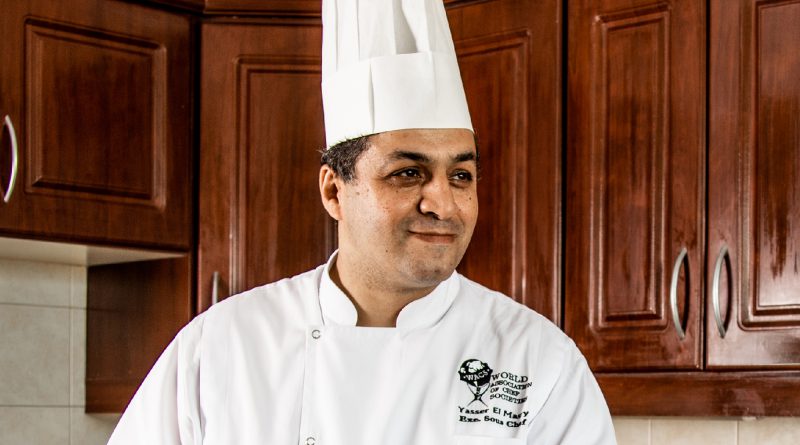Executive Sous Yasser El Masry
At InterContinental Cairo Citystars
Culinary runs in the family; turned into passion and created the drive to earn his bachelors and later his Master’s; chef Yasser El Masry tells it all and why the French cuisine became a specialty, still his passion for the Egyptian recipes and dishes haunted him till he mastered it all. He also shares with us how the kitchen is being prepared for service during Ramadan and his favorite Egyptian dish during the holy month. Read through to learn his secret tips and tricks for the best Egyptian Keshk you will ever make.
How did you start your career and when?
In 1989, and I was significantly influenced by my eldest brother, who is a chef himself. I earned my BA from the Faculty of Tourism and Hospitality, and I was keen on enhancing my passion for culinary creations, so I continued to earn my Master Degree, in which I discussed a thesis of a detailed study of guests and customers impressions about Egyptian cuisine in hospitality industry.
What’s the business like since Corona?
In general, hospitality and restaurants industry was negatively affected by Covid-19 crisis and the related lockdown; the restaurant industry has been hit particularly hard by the effects of lockdown However, since re-opening, there have been modest signs of recovery, but social distancing, recurrent pandemic waves and widespread working from home continue to limit progress. Some of our restaurants remained open for delivery and takeaway earlier during the lockdown, later we have seen signs of recovery, but the industry remains vulnerable.
In InterContinental Cairo Citystars and as the world adjusts to the new norms and expectations, we have enhanced our guests’ experience by redefining cleanliness and supporting their wellbeing, that’s why we have expanded our commitment to cleanliness through IHG Clean Promise; a system that includes deep cleaning with hospital-grade disinfectants in guest rooms, restaurants and public spaces, in addition to a plenty of tangible evolved procedures throughout the hotel, including additional regular deep cleaning of high touch surfaces in public areas, maintaining social distancing, and best practices for pools, fitness centers, restaurants, bars and lounges. Therefore, we are applying effective new standards and service approach to buffets, banquets, rooms- service and catering to ensure ultimate hygiene standards are in place.
How is Ramadan different from the rest of the year?
Ramadan is the month of worship, charity and family. This month has a charm of its own and it is a lovely opportunity for family and friends’ gatherings around Iftar table. Ramadan nights have a real charm that could only be enjoyed in the company of loved ones. So, besides the religious element, Ramadan in Egypt is a month of festivities and warmth.
What’s your specialty cuisine?
French cuisine; one of the best in the world. And it is famous for its freshly baked bread, a plethora of scrumptious cheeses, and the most extensive pastry selection in the globe. It also has an astonishing impact on other countries culinary scenes.
What’s a secret ingredient you always use in your special dishes?
Onions, garlic, freshly crushed black peppercorns and fresh cilantro
What’s your favorite Ramadan dish? please share it’s recipe.
Egyptian Keshk
Egyptian keshk is such a hearty and comforting Egyptian home-cooked dish. The fried caramelized onions bring the whole dish together. Serve it with simple cooked chicken and white rice, and enjoy every creamy mouthful of this classic Egyptian meal.
Ingredients
• 2 cup yoghurt (110 gram each)
• 4 tablespoon flour
• 1/2 cup milk
• 2.5 cup chicken broth/stock (about 600 ml)
• salt and pepper (to taste)
• 1/2 small lime (juiced – OPTIONAL)
• 1 medium onion (sliced)
• 1/4 cup vegetable oil
Method
1. In a bowl, mix yoghurt and flour and leave the mixture for a couple of hours outside the fridge (for best results leave it overnight).
2. Add milk to the yoghurt-flour mixture to thin it out and whisk.
3. Move the mixture to a medium pot and heat on medium low heat, while gradually adding warm chicken stock and whisking to the desired consistency (like milk pudding). Note that Keshk thickens more after cooling. You don’t have to use the full chicken stock quantity if you are happy with the consistency with less stock than advised here.
4. Add salt and pepper, juice of half a lime (optional), then pour Keshk into the serving dish/bowl. (You can also add cooked chicken slices to it before pouring into the serving bowl).
5. Chop the onion into small thin slices and fry in oil until golden. Drain on kitchen paper and sprinkle over the keshk. Serve warm with chicken and rice or with baladi bread.

